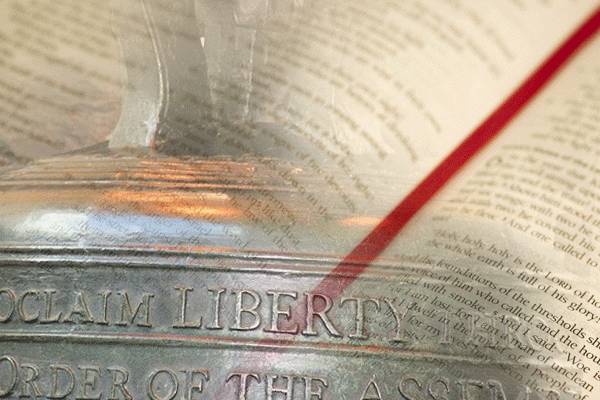The Sabbath as Civil Liberty

There is that part of me that likes to try and “kick against the goads.” It has been both a blessing and the bane of my existence but it's something that is deeply entrenched in my being. Perhaps this is why I have alway carried a bit of a secret pride about our Adventist stance on religious liberty and the closely related concept of the separation of church and state—something I dare say is precariously perched in the American political climate of late. It is loaded with anti-establishment potential and, as already alluded to, goes against the main current of American Evangelical Christianity and its proclaimed desire to establish the United States as a Christian theocracy (or “re-establish” depending on whom one might be speaking with).
Adventism does indeed occupy a minority position when it comes to this very important Constitutional issue. And going beyond my pseudo-rebellious streak, the topic deserves much more than a passing glance or a complacent acceptance as part and parcel of Adventist religio-politics. And it is when I remember this that I most always become a bit agitated and, in all honesty, a bit worried about the whole discourse within the church.
I think Jan Paulsen, [former] SDA World Church President, sums up the issue at hand nicely in the interview you can read elsewhere in this issue - see the article entitled “On Church & State:
“It is right that the laws that govern any society be of such a nature that they allow the freedom that individuals must have—and that churches and organizations must have—to subscribe to and express their religious convictions. I do not believe that it is good when laws are being enacted that will govern the religious activities or the status of religious convictions in any given matter. One has to move very, very cautiously when it comes to encouraging laws that regulate a religious consciousness. Laws are there to protect civil rights, and the freedom of conscience is a civil right.”
If it all seems too nuanced, the point I am trying to focus on here is the fact that the issue of religious liberty does not simply exist as a standalone issue. Rather, it is part of the larger realm of civil liberties - something that is constantly being challenged and defended on a global scale.
This is something we as Adventists often overlook in our discourse - especially in light of our eschatological self-awareness. If the point of raising an outcry against legislation that potentially threatens our Adventist way of life or of supporting legislation that maintains the freedom to worship and live as we please is limited to the scope of just our Adventist-specific concerns, then we are really not being so different than the very forces we kick against.
The Old Testament concept of the Sabbath is less a liturgical concept (relating to worship) and more a part of the backbone that helps structure the Yawhistic social ethic found in the Law. The keeping of the Sabbath, as a signifier of God’s people, was not simply akin to a badge or regalia worn to show allegiance and obedience to God. More than this, the establishing of the Sabbath commandment was an attempt by God to ensure his people would not create a society that practiced the same sort of oppression endured by the Israelites under Egyptian rule. As a reminder to the Israelites that they had once known nothing of life other than ceaseless labor and toil, the Sabbath commandment forbids the people of God from creating a society in which a person’s worth in a community would be defined by toil alone. The Sabbath commandment suggests that a person is to be afforded a full measure of dignity simply because he/she is a creation of the creator God - a truth, when upheld, prevents us from requiring individuals to labor every single day of every single week of their lives - an undignified existence for sure.
As Sabbath-keepers, we hold a special responsibility to raise a voice in broad culture and against any oppressive practices of world governments—not simply to uphold our own Sabbath practices but to take the spirit of the Sabbath into the world and raise an outcry whenever people are being oppressed and their freedoms are being threatened.
As Adventists we should be keenly interested, then, on the broader scope of civil liberties and the meaning of true freedom. Sadly, we often care little for the world in the name of “being in but not of the world” and the voice of Yahweh is stifled. Meanwhile, the most unlikely persons to be considered by the religious are the ones raising the loudest cry against injustice and oppression in the world. I am often shamed when I hear of rock stars, actors and other people I was raised to steer clear of (which I never did - if you recall,
I like to kick against the goads) that are doing great and remarkable things in raising awareness and raising support for the sake of the those whose voices have been silenced or incapacitated. Here I’ll go out on a long and quickly thinning limb and suggest that while we often ponder the notion that if God’s people don’t respond, then “even the rocks will cry out” I dare say that perhaps they already have. God will have his way, with or without us.
This article was previously published in July 2006.